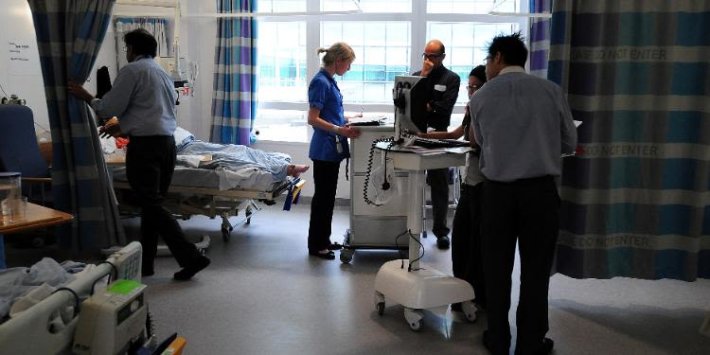Sajid Javid Warns Winter Poses “Greatest Threat” To Pandemic Recovery And Daily Cases Could Hit 100,000
"We've always known that the winter months would pose the greatest threat to our road to recovery,” Javid said. (Alamy)
4 min read
Sajid Javid has issued a stark warning that coronavirus “remains a threat” to the nation’s pandemic recovery as winter provides the “perfect conditions” for coronavirus and other seasonal diseases.
Speaking at a Downing Street press conference, the health secretary warned that the UK could see daily cases peak “as high as 100,000 a day” in coming months, more than double the current figures.
"We've always known that the winter months would pose the greatest threat to our road to recovery,” Javid said.
“The darker skies, the colder weather provide perfect conditions not just for Covid-19 to thrive, but for other seasonal viruses too like flu and norovirus. And ahead of winter, just as we expected, we're starting to see this impact.”
New coronavirus cases in the UK crept above 49,000 this week for the first time since mid-July, with 49,156 cases recorded on Wednesday.
Tuesday also saw the highest recorded death toll since March with 223 new deaths within 28 days of a positive coronavirus test.
Javid continued: “The link between cases and hospitalisations and deaths has significantly weakened but it's not broken.
“So we must all remember that this virus will be with us for the long term, and that it remains a threat, a threat to our loved ones, and a threat to the progress that we've made in getting our nation closer to normal life.”
He added that the government was “looking closely at the data”, but would not be implementing its "Plan B" contingency measures “at this point".
“We'll be staying vigilant, preparing for all eventualities, while strengthening our vital defences, that can help us fight back against this virus.”
Earlier on Wednesday, Downing Street also rejected calls from the NHS to move to its “Plan B”, with a spokesperson saying the number of hospital admissions and deaths are still "substantially lower" than they were earlier in the year.
The sharp increase in case numbers has led some to speculate whether further coronavirus restrictions will need to be imposed this winter to tackle the spread of the virus.
But Business Secretary Kwasi Kwarteng said on Wednesday morning that the UK will not need a winter lockdown despite admitting "concern" over a sharp rise of Covid-19 cases and deaths.

The health secretary made his stark warning ahead of the announcement that the UK has secured 730,000 courses of antiviral drugs to help reduce the severity of symptoms and speed up recovery time for those who test positive.
Javid said the treatments — which target the virus at the early stages to prevent it progressing — would act as “a new defence in our arsenal” as the country braces for another difficult winter amid the ongoing pandemic.
It’s expected that the new drugs could be rolled out via clinical trials over the winter months, the health secretary claimed, with plans for wider deployment in summer 2022.
The government announced on Wednesday it had secured 480,000 doses of the drug Molnupiravir, produced by pharmaceuticals giant Merck, which is administered as a twice-daily tablet.
It reportedly reduced the risk of hospitalisation by 50% in a clinical trial of 775 high-risk, unvaccinated adults with Covid-19.
250,000 doses of PF-07321332/Ritonavir, produced by Pfizer, have also been purchased. The drug is still undergoing clinical trials, with three Phase Two and Phase Three trials looking at the clinical effectiveness of the treatment currently underway.
The two new drugs are yet to be approved by the Medicines and Healthcare products Regulatory Agency.
Deputy chief medical officer Jonathan Van-Tam said the antivirals would “bring another key intervention to the table”.
“They will be particularly vital in protecting those who may not get the same antibody response to the vaccines as the majority of the population,” he said.
Van-Tam added that the government would “work quickly” to ensure that “the right cohorts” received the drugs should they be approved by the medicines regulator.
“This is a very important development in our mission to find antivirals for those exposed to COVID-19, supporting the renowned vaccination programme and the NHS over the coming months,” said Eddie Gray, chair of the Antivirals Taskforce, which helped secure the two treatments.
“Should they be approved by the medicines regulator, we could see these treatments rolled out to patients this winter, providing them with vital protection.”
